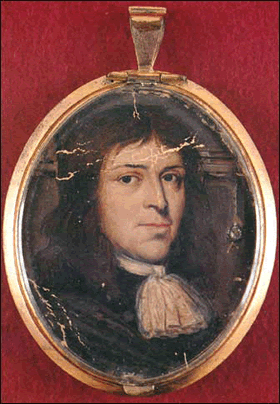The Reverend Samuel Parris
Born in 1653, Samuel Parris initially pursued a career as a merchant and planter in both London and Barbados. Perhaps anticipating his later career in the ministry, or to elevate his status in business, Parris attended Harvard for a few years in the early 1670s. But when his father died, he left Massachusetts without having graduated and returned to Barbados to resume his mercantile activities. In 1680, he again headed for Boston to improve his prospects. Although some detractors have alleged that he was a failure as a businessman, according to Parris's biographer, he enjoyed "modest success."
But commerce proved unsatisfying, and Parris decided on a new career in the ministry. Since it was unusual to enter the ministry without a college degree, particularly as an ordained minister, it is possible that Parris completed his schooling, though there is no record of this. In 1688, Parris began negotiations with Salem Village for the opening vacated by Deodat Lawson, and the following year, he accepted the post. He permanently cut his business ties in Boston, settled into Salem Village's ministry house with his family, and was ordained.
The union of Parris and Salem Village appeared to begin smoothly, but within two years of his arrival, dissatisfaction with Parris was evident. His difficulties stemmed in part from disagreements over his contract, which never seems to have been formalized. One recorded agreement with Parris (of which he denied any knowledge!) provided him with the ministry house and lands only so long as he remained minister. However, some months later, another meeting of the village, perhaps attended by different people, granted Parris outright ownership of the house and lands. Combined with Parris's plans to refurbish the meeting house, commensurate with its new status as a full church, Parris's ministry signaled a church both more intrusive and more expensive than some villagers wished.
Parris also revealed traits that a number of Salem Villagers, including a few church members, found unwelcome. A serious, dedicated minister, he combined his evangelical enthusiasm to revitalize religion in Salem Village with psychological rigidity and theological conservatism. In contrast to Salem Town's church and most Puritan churches at the time, Parris continued to uphold traditional strict standards for church membership. The Salem Town church had become more inclusive in its membership, making it relatively easy to become a full member. It also accepted the "Half-Way Covenant," which brought into partial membership adults who had been baptized but had not made a public declaration of experiencing God's free grace to become full members. The children of these half-way members were then made eligible for baptism. Parris, however, rejected the Half-Way Covenant and offered baptism only to professed believers and their children. Most village church members were happy with Parris's orthodoxy, which elevated their status by sharply distinguishing them from non-church members. But a minority dissented and found allies among non-members, who constituted a large and influential part of the Salem Village community.
To read more about Salem Village's divisions in the early years of Parris's ministry, click Next.
